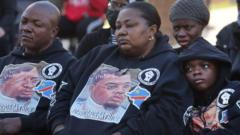Israelis are taking to the streets in large numbers to voice their discontent with Prime Minister Benjamin Netanyahu’s handling of both national security and domestic issues, including recent military actions in Gaza and perceived threats to democratic governance.
Israelis Protest Amid Gaza Assault and Political Turbulence

Israelis Protest Amid Gaza Assault and Political Turbulence
Protests erupt in Israel as citizens demand a cease-fire in Gaza and challenge government actions that threaten democracy.
On the morning of March 19, 2025, demonstrators converged outside the Parliament in Jerusalem, rallying against Netanyahu’s administration, which they accuse of undermining democratic institutions while intensifying military aggression in Gaza. Following a series of deadly airstrikes that ended a temporary truce with Hamas and came on the heels of protests aimed at governmental reform, a wave of public dissent is sweeping across the nation.
The tensions, rooted in long-standing frustrations over security and political governance, have reignited significantly after airstrikes carried out early Tuesday morning across the Gaza Strip. Protesters are calling not only for an immediate cease-fire to facilitate the safe return of hostages but also for an end to Netanyahu's perceived maneuvers to consolidate power, particularly his recent attempt to dismiss the head of Israel’s domestic intelligence agency.
Accusations are rising that the Prime Minister's focus is more about maintaining his political edge, especially with an impending critical budget vote, than it is about the people’s safety. As civil unrest mounts, Israeli media echoes earlier warnings from security officials, suggesting that internal political strife is making the country more vulnerable to external threats.
Leading the demonstrations is opposition figure Yair Lapid, who is rallying citizens through social media, urging them to take action and unite against what he describes as a government that is "beyond limits." He emphasized the importance of solidarity among the populace to demand change and protect the nation’s democratic fabric.
In a statement regarding the renewed military campaign in Gaza, Netanyahu framed it as a necessary action to pressure Hamas into releasing hostages, asserting that future negotiations would only happen “under fire.”
As protests and military actions continue to escalate, Israel finds itself at a crucial juncture, balancing national security interests with the pressing demands for democratic integrity from its citizens.
Rawan Sheikh Ahmad contributed reporting from Haifa, Israel. Isabel Kershner has been a Times correspondent covering Israeli and Palestinian affairs since 1990.
The tensions, rooted in long-standing frustrations over security and political governance, have reignited significantly after airstrikes carried out early Tuesday morning across the Gaza Strip. Protesters are calling not only for an immediate cease-fire to facilitate the safe return of hostages but also for an end to Netanyahu's perceived maneuvers to consolidate power, particularly his recent attempt to dismiss the head of Israel’s domestic intelligence agency.
Accusations are rising that the Prime Minister's focus is more about maintaining his political edge, especially with an impending critical budget vote, than it is about the people’s safety. As civil unrest mounts, Israeli media echoes earlier warnings from security officials, suggesting that internal political strife is making the country more vulnerable to external threats.
Leading the demonstrations is opposition figure Yair Lapid, who is rallying citizens through social media, urging them to take action and unite against what he describes as a government that is "beyond limits." He emphasized the importance of solidarity among the populace to demand change and protect the nation’s democratic fabric.
In a statement regarding the renewed military campaign in Gaza, Netanyahu framed it as a necessary action to pressure Hamas into releasing hostages, asserting that future negotiations would only happen “under fire.”
As protests and military actions continue to escalate, Israel finds itself at a crucial juncture, balancing national security interests with the pressing demands for democratic integrity from its citizens.
Rawan Sheikh Ahmad contributed reporting from Haifa, Israel. Isabel Kershner has been a Times correspondent covering Israeli and Palestinian affairs since 1990.




















